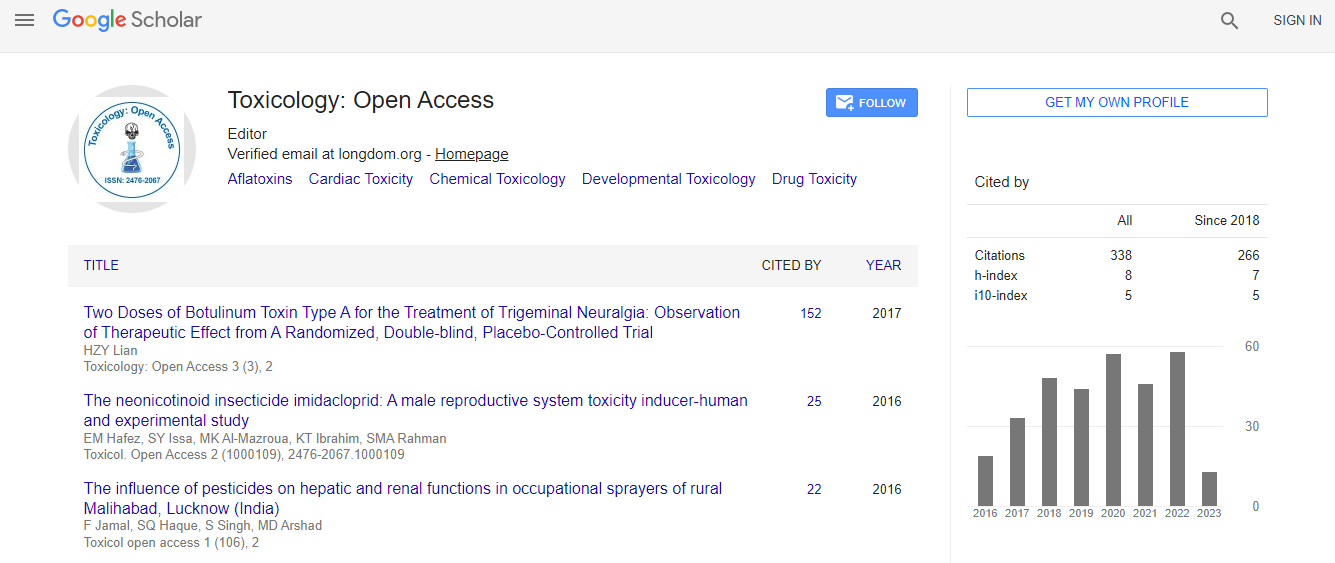Our Group organises 3000+ Global Conferenceseries Events every year across USA, Europe & Asia with support from 1000 more scientific Societies and Publishes 700+ Open Access Journals which contains over 50000 eminent personalities, reputed scientists as editorial board members.
Open Access Journals gaining more Readers and Citations
700 Journals and 15,000,000 Readers Each Journal is getting 25,000+ Readers
Google Scholar citation report
Citations : 336
Toxicology: Open Access received 336 citations as per Google Scholar report
Indexed In
- Google Scholar
- RefSeek
- Hamdard University
- EBSCO A-Z
- Geneva Foundation for Medical Education and Research
- Euro Pub
- ICMJE
Useful Links
Related Subjects
Share This Page
The anti-proliferative activity of Coriandrum sativum alcoholic extract on HCT-116 and MCF-7 cell lines
14th World Congress on Toxicology and Pharmacology
Eugenia Dumitrescu, Florin Muselin, Roxana Popescu, Tulcan Camelia, Andreia Chirila and Romeo T Cristina
Banat′s University of Agriculture and Veterinary Medicine, Romania Univesity of Medicine and Pharmacy, Romania
Posters & Accepted Abstracts: Toxicol Open Access
Abstract
Statement of the Problem: It is known that vegetal extracts can generate positive responses in stages of several patho-processes. The anti-oxidant; protection against DNA damage and cancer activities of Coriandrum sativum were intensely studied in the last decade. Our research envisaged the polyphenolic compounds√ʬ?¬? structure and the anti-proliferative biologic activity of C. sativum 10% alcoholic extract against HCT-116 and MCF-7 cell lines. Methodology: The C. sativum extract was obtained respecting the Romanian Pharmacopoeia 10th edition, the plant being lyophilized (with Ilshin Kryptonstraat 11, 6718WR EBE lyophilisator to -55 oC, 5 mTorr pressure and 24 hours lyophilization time). The polyphenols were determined by LC-MS and the in vitro evaluation effects by the MTT proliferation test, using HCT116 (colorectal carcinoma) and MCF7 (mammary adenocarcinoma). The cells were seed as: 2√?¬?104 (MCF7) and 1√?¬?104 (HCT) in 96 well plates. The lyophilized extracts were suspended in specific culture medium being obtained a 300 mg/mL C. sativum stock solution. From this, different test concentrations were prepared by dilution (300, 200, 100 and respectively 50 mcg/mL). Result & Conclusion: As a following, after 24 hours from the exposure, using HCT-116 and MCF-7 cell lines it was observed that the cellular proliferation reduced, this being correlated to dose and the alterations of cell morphology to the groups studied; to great extract doses, apoptotic and necrotic alterations were observed, both for HCT and MCF cells; the IC50, representing concentration to which a marker substance is reducing the tissues viability with 50% after a fixed time exposure period wasn√ʬ?¬?t observed for the cell lines used in this test; the chromatographic analysis of C. sativum alcoholic extract evidenced the presence of the polyphenolic compounds, the greatest concentrations were ascertained for epicatechin (77.083 mcg/mL) and rutin (30.279 mcg/mL), substances with known hard anti-oxidant proprieties. References 1. Rayar A, Manivannan R (2015) In Vitro Cytotoxicity Activity of Phytochemicals Isolated from Coriandrum sativum Linn. in Selected Cell Lines. Journal of Pharmacy and Biological Sciences; 10(3): 38-48. 2. AL Snafi A E (2014) The Pharmacological importance and chemical constituents of Arctium lappa: A review. International Journal for Pharmaceutical Research Scholars; 3(1-1): 663-670. 3. Kumar R S, Balasubramanian P, Govindaraj P, Krishnaveni T (2014) Preliminary studies on phytochemicals and antimicrobial activity of solvent extracts of Coriandrum sativum L. roots (Coriander). Journal of Pharmacognosy and Phytochemistry; 2(6): 74-78. 4. Nithya T G, Sumalatha D (2014) Evaluation of in vitro anti-oxidant and anticancer activity of Coriandrum sativum against human colon cancer HT-29 cell lines. International Journal of Pharmacology and Pharmacy Science; 6(2): 421-424. 5. Tang E L, Rajarajeswaran J, Fung S Y, Kanthimathi M S (2013) Antioxidant activity of Coriandrum sativum and protection against DNA damage and cancer cell migration. BMC Complementary and Alternative Medicine; 13: 347.Biography
Eugenia Dumitrescu has her expertise in the veterinary field, reproductive toxicology, heavy metals, phyto-therapy and oxidative stress in animals. She is an Associate Professor at the Faculty of Veterinary Medicine at Banat’s University of Agriculture and Veterinary Medicine, Romania.
Email:cris_tinab@yahoo.com

 Spanish
Spanish  Chinese
Chinese  Russian
Russian  German
German  French
French  Japanese
Japanese  Portuguese
Portuguese  Hindi
Hindi 